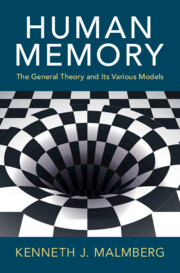Book contents
- Human Memory
- Human Memory
- Copyright page
- Contents
- Figures
- Foreword
- Preface
- Acknowledgments
- Chapter 1 Introduction
- Chapter 2 Models of Cognitive Control, Storage, and Retrieval
- Chapter 3 Search and Detection
- Chapter 4 Sequential Effects
- Chapter 5 Forgetting
- Chapter 6 Differentiation
- Chapter 7 Knowledge
- Chapter 8 Modeling the Consequences of Testing Memory
- Chapter 9 The Buffer Model Revisited
- References
- Index
Chapter 3 - Search and Detection
Published online by Cambridge University Press: 17 January 2025
- Human Memory
- Human Memory
- Copyright page
- Contents
- Figures
- Foreword
- Preface
- Acknowledgments
- Chapter 1 Introduction
- Chapter 2 Models of Cognitive Control, Storage, and Retrieval
- Chapter 3 Search and Detection
- Chapter 4 Sequential Effects
- Chapter 5 Forgetting
- Chapter 6 Differentiation
- Chapter 7 Knowledge
- Chapter 8 Modeling the Consequences of Testing Memory
- Chapter 9 The Buffer Model Revisited
- References
- Index
Summary
Investigations of the contribution of controlled versus automatic information processing are presented using two superficially different procedures as examples: visual search and episodic recognition memory. Whereas most frameworks consider the possibility that tasks may be performed either in a controlled fashion or automatically, the General Theory assumes that both types of information processing may contribute to their performance. Thus, the empirical question is the extent to which each type of information processing contributes to task performance and under what conditions.
Information
- Type
- Chapter
- Information
- Human MemoryThe General Theory and Its Various Models, pp. 51 - 88Publisher: Cambridge University PressPrint publication year: 2024
